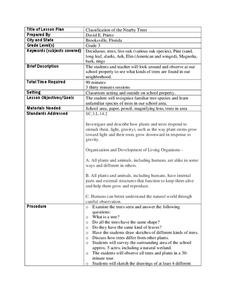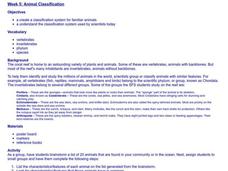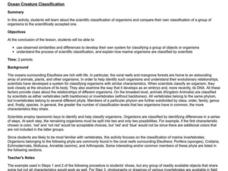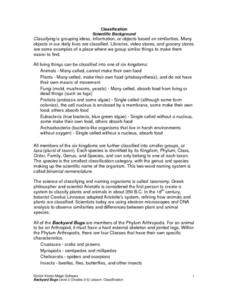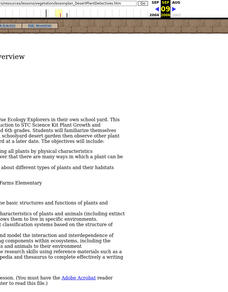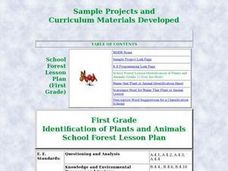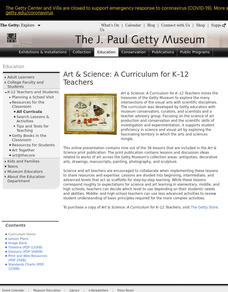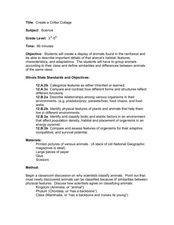Curated OER
Classification 2: A Touch of Class
Students examine how many kinds of living things (e.g. plants and animals) can be sorted into groups in many ways using various features to decide which things belong to which group and that classification schemes vary with purpose.
Curated OER
Plant Classification
Young scholars share with the class how they think plants are classified and are assessed on their prior knowledge. They use a packet to complete throughout the week at their own pace, which includes various activities to familiarize...
Curated OER
Classification of the Nearby Trees
Third graders practice using classification techniques to identify local trees. In this plant life instructional activity, 3rd graders discuss how trees differ from other plants and what characteristics are unique to trees alone....
Curated OER
Classification
Students complete an animal classification activity. In this classification lesson, students learn about the seven classification levels of animals. Students are given several animal sheets in which they separate 12...
Curated OER
Animal Classification
Young scholars list characteristics and features of animals found in their community. They then group the animals according to how they are similar and different and create names for each group. They then create a chart of their...
Curated OER
Classify UT Plants and Animals
Students practice using 2 different plant classification keys to identify species. They make choices between the similarities and differences between their object and the classification scheme.
Curated OER
Classification Schemes
Students place organisms into the correct classification and justify their reasoning. They must include all objects and have a reason for their decisions.
Curated OER
Ocean Creature Classification
Students develop their own system for classifying a group of objects or organisms using observed similarities and differences. They investigate the process of scientific classification, and explain how marine organisms are classified by...
Curated OER
Why Taxonomy?
Students investigate the need for taxonomy and perform a variety of activities that will make taxonomy real to them. They identify plants and animals in a specific area and record the information on a data sheet. They write stories...
Curated OER
Backyard Bugs
Explore the concept of scientific classification and the similarities and differences between plant and animal species. Your class will participate in hands-on activities by investigating dichotomous keys and classifying their shoes. To...
Curated OER
Plant Diversity and Distribution
Students construct a defined plot on school grounds and observed patterns in plant life. They count trees, shrubs, cacti and record on a data sheet. They compare data and generate a plant diversity overlook for their school.
Curated OER
Fruits and Veggies - Yum!
Students use Inspiration to drag pictures of fruits and vegetables into the correct category. They discuss the name of other fruits and vegetables. They explain why or why not they like that particular fruit or vegetable. Students...
Curated OER
Classification 1: Classification Scheme
Students examine how many kinds of living things can be sorted into groups in many ways using various features to decide which things belong to which group and that classification schemes vary with purpose.
Curated OER
The Kingdoms
Students review the various categories in taxonomy. In groups, they identify the characteristics of each kingdom and compare and contrast them. They define the terms binomial nomenclature and morphology. To end the activity, they...
Curated OER
What's Your Genus? Scientific Classification and the VT
Students understand the definition of binomial nomenclature. For this binomial nomenclature lesson, students classify ordinary animals by seeking their scientific names. Students participate in a knowledge hunt using binomial nomenclature.
Curated OER
The Five Classes of Vertebrates
What a terrific lesson plan! Learners discuss the animal kingdom, and classify them as vertebrates and invertebrates. They also identify them as fish, amphibians, reptiles, birds, and mammals. There is even a taxonomic breakdown of...
Curated OER
Desert Plant Detectives
Learners examine and categorize plants in their own schoolyard desert garden and then observe other plant areas of their schoolyard.
Curated OER
School Yard Park/ Ecosystem
Fifth graders examine ecosystems in their schoolyard. In this nature and ecosystem instructional activity, 5th graders map their schoolyard into workable plots. They classify plants and animals found in the plot. They revisit their site...
Curated OER
Identification of Plants and Animals
First graders identify a variety of plants and animals that can be found in the school forest, then differentiate between plants and animals. They find examples of characteristics used to differentiate between plants or animals.
Curated OER
Big Cat Classification
First graders discover the different names and classifications of big cats by using word processing applications. In this animal life lesson, 1st graders investigate one big cat and create a database of facts about it using an word...
Curated OER
Clearly Classified
Young scholars review the classification system for living organisms and apply it the classification of insects and flowers in the still life by Ambrosius Bosschaert. They create a chart classifying the animals and plants in the painting...
Curated OER
Classifying Commercial Marine Species
Students investigate taxonomy. They explore some of the commercial marine species caught in Magdalena Bay and develop a classification system for presented animals.
Curated OER
Create a Critter Collage
Young scholars create a collage. In this animal classification lesson plan, students discuss why and how scientists classify animals. Young scholars view pictures of different animals and decide which class each animal belongs to....
Curated OER
Species Diversity in Ecosystems with Different Techniques of Land Management
Students visit numerous places to help in their understanding of Ecology. In this biology lesson plan, students will learn about characteristics and how to identify numerous plants and animals. This lesson plan allows for many field trip...


